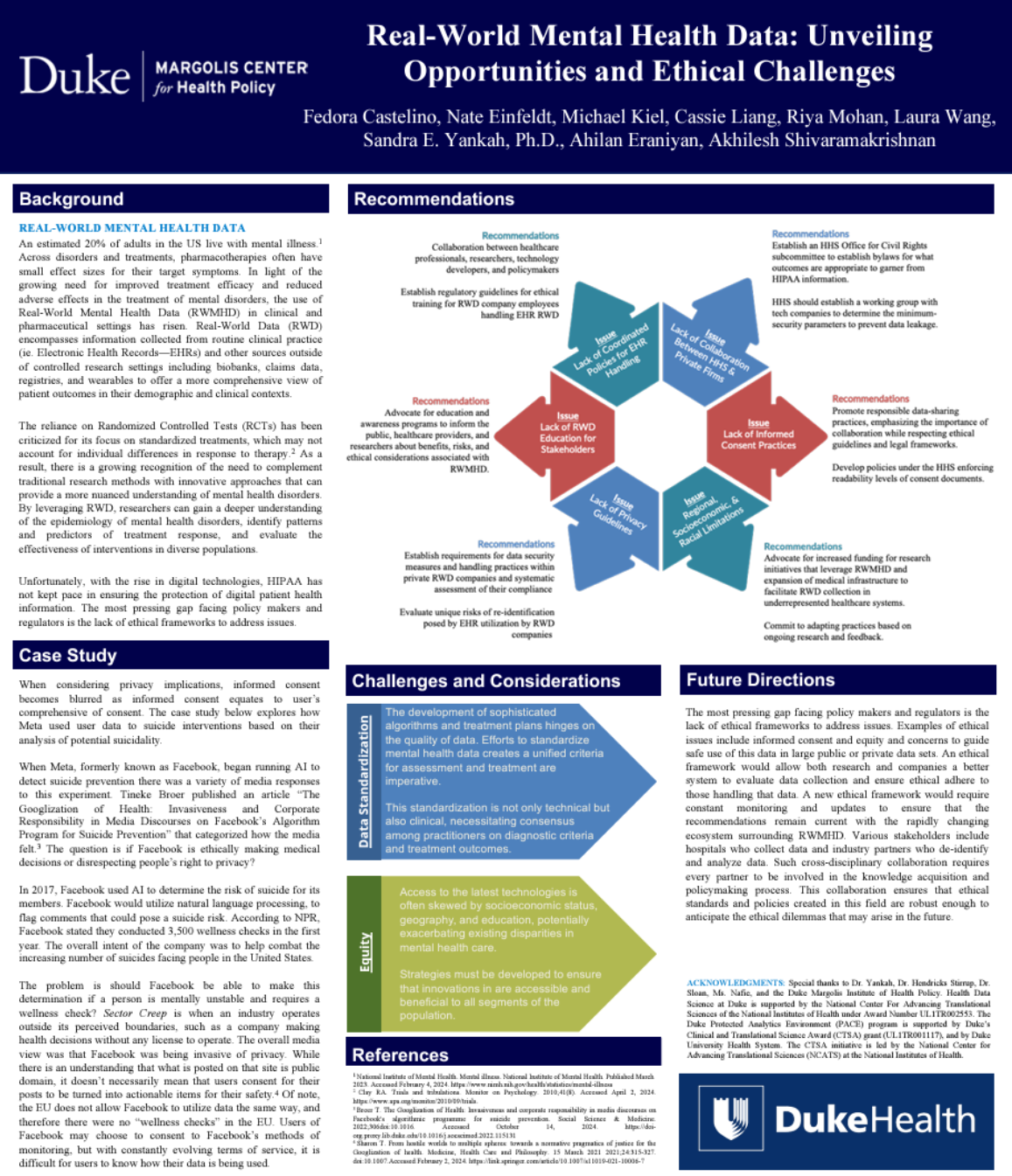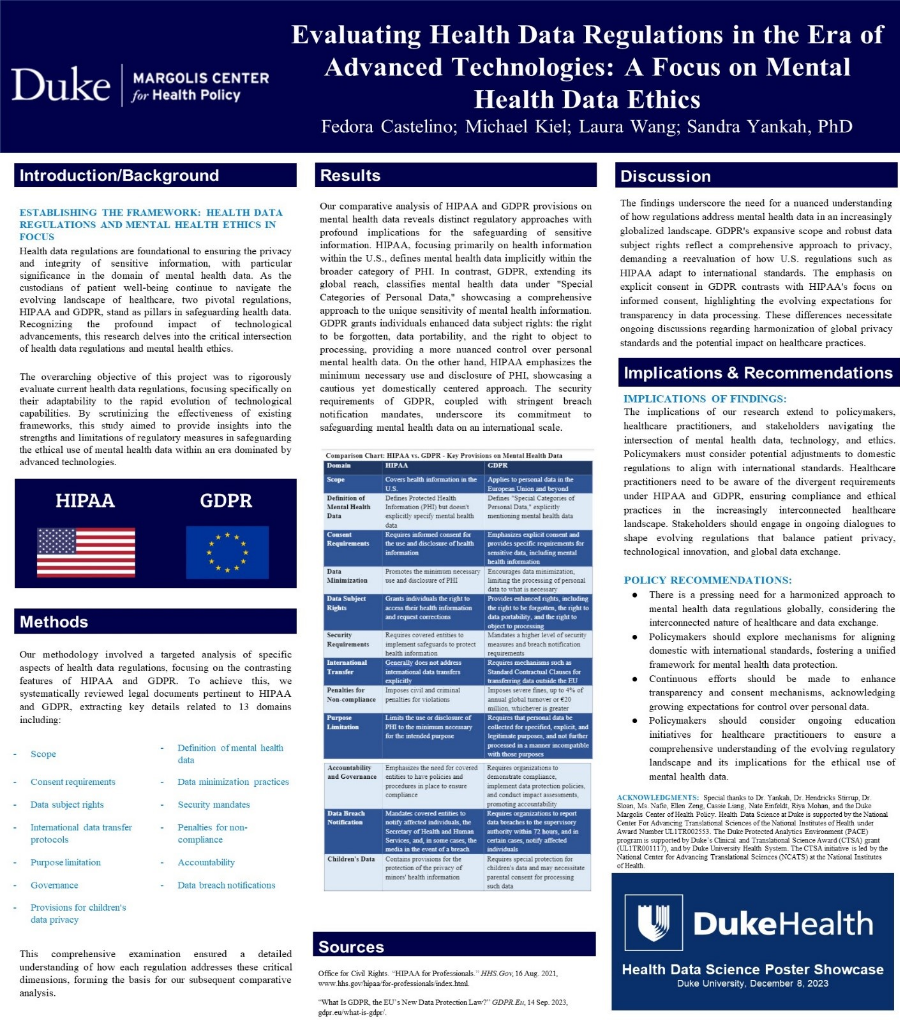

Team profile by members of the Bioethics and the Use of Real-World Mental Health Data project team
Introduction
Real-world mental health data (RWMHD) holds great promise for revolutionizing mental healthcare by providing valuable insights into treatment responses, personalized care and the underlying social determinants of mental health. However, to fully realize its potential benefits, it is imperative to address ethical considerations related to privacy, data protection and informed consent. This project thoroughly examined these challenges, shedding light on the limitations posed by existing policy frameworks such as HIPAA.
We propose six key recommendations, including the establishment of ethical guidelines, the formation of a governing body for RWD oversight and the implementation of enhanced informed consent practices. These measures are aimed at safeguarding patient rights and upholding ethical research standards while responsibly harnessing the potential of RWMHD.
Moving forward, advancing RWMHD requires extensive research efforts to develop comprehensive ethical frameworks and foster interdisciplinary collaboration, ensuring that this transformative tool is used ethically to enhance global mental health outcomes.
Team Goals
The project’s key research questions revolved around understanding the landscape of RWMHD usage in both clinical and research environments.
- First, we aimed to identify the most commonly used types of RWMHD in these settings, shedding light on prevailing practices.
- Second, we explored the legal frameworks governing the transfer and utilization of RWMHD at both national and international levels within research and clinical contexts, aiming to understand the regulatory landscape surrounding its use.
- Third, the project delved into the bioethical considerations pertinent to policymakers and stakeholders, emphasizing the need for ethical and responsible use of RWMHD to safeguard privacy, autonomy and well-being.
Key Activities
As part of our project plan, we engaged in several key activities:
- We conducted a comprehensive literature review, which encompassed peer-reviewed articles, grey literature, case studies and relevant policy documents. This review provided us with valuable insights into existing knowledge and best practices in our field.
- We facilitated experiential learning opportunities, such as demoing a RWMHD platform, to familiarize ourselves with the functionalities and capabilities of similar platforms.
- Stakeholder engagement was a crucial aspect of our project, involving activities such as learning calls and didactics to ensure that all relevant parties were informed and involved throughout the process.
These activities collectively aimed to provide diverse perspectives and enhance our understanding of real-world data and ethics.
Learn more about our stakeholder engagement activities!

Overview of Key Findings
Our research identified common types of RWMHD frequently utilized in mental health contexts. These include Electronic Health Record (EHR) data, administrative and claims data and patient-generated data from websites and wearable sensors.
Additionally, we explored the regulatory landscape governing RWMHD, such as the Health Insurance Portability and Accountability Act (HIPAA) and the Health Information Technology for Economic and Clinical Health (HITECH) Act. Our findings underscored significant gaps in patient privacy and consent protections, highlighting areas for improvement to ensure the ethical use of RWMHD in mental health research and practice.
Our research also revealed several implications for the responsible utilization of RWMHD. Firstly, inadequate privacy protections may jeopardize patient privacy and autonomy, potentially leading to breaches of confidentiality and a loss of trust in healthcare systems. Secondly, the absence of robust consent frameworks raises ethical concerns regarding data usage, undermining principles of patient autonomy and beneficence.
Furthermore, insufficient protection of RWMHD may exacerbate the risk of discrimination and stigmatization, leaving individuals vulnerable to discriminatory actions or social repercussions based on their mental health status. This includes risks such as employment discrimination, social ostracism or denial of insurance coverage.
Therefore, it is crucial to implement strong safeguards to mitigate these potential harms and uphold ethical standards in mental health research and practice.
Project Outputs
Following the successful completion of presentations at various conferences and symposia, including the Bass Connections Showcase, Precision Medicine Tricon and the Health Data Science Showcase, our team is now focused on the next steps in disseminating our findings.
Our primary goal is to publish an overview of our research findings in a peer-reviewed journal, ensuring that our work reaches a wider audience and contributes to the ongoing discourse in the field. Additionally, we are exploring opportunities for further dissemination through workshops, webinars and collaborations with other research teams.
By continuing to share our findings through various channels, we aim to maximize the impact of our research and facilitate knowledge exchange within the research and policy communities.

Team Member Reflections
Throughout this project, we’ve collectively navigated the complex ethical landscape of mental health data, grappling with complex issues at the intersection of technology, policy, and patient care. Our experiences have challenged us to critically examine the ethical implications of data handling practices, while also fostering interdisciplinary collaboration and intellectual growth.
As we share our individual reflections, we invite you to join us in contemplating the ethical complexities inherent in the use of real-world data in mental health research and the imperative of upholding ethical principles to ensure patient well-being and equitable access to care.
Nate Einfeldt (M.B.A. ’24)
“Joining this Bass Connections team has given me a wide range of new knowledge. I learned about the process of getting approval for research projects under the IRB. By understanding the ethical principles that the IRB utilizes it helped frame the future discussion of bioethics that we will be solving.
Through our discussions with Holmusk, it showed how companies define ethical principles. Those definitions aren’t a standard established when handling HIPAA data, which can cause concern if certain firms don’t have strong measures of safety and handling of private data, although it was considered sanitized.
I also appreciated learning the white paper creation process. When multiple team members develop the outline together, there are numerous ideas being discussed simultaneously. Through our iterative process of refining and getting feedback from the Margolis Center it helped direct our research and paper creation process.
Overall, it has been a great experience to work with other Duke students and the Margolis Center to continue to learn more about how we should handle HIPPA-protected Mental Health RWD.”
Cassie Liang (M.S.S. ’25)
��“As part of this Bass Connections team, I’ve had the profound opportunity to navigate the ethical landscape of RWMHD. Our exploration began with a deep dive into the governance of such data under HIPAA, encountering a fragmented landscape where the personal stories and crises of individuals are often lost amidst legalities and technological advances.
The experience has been illuminating, revealing the complex interplay between patient privacy and the vast potential of RWMHD to inform and transform psychiatric care. The drafting of a white paper on this topic underscored the nuances of data ethics in the digital age.
Collaborating with stakeholders from varied fields, we confronted the challenges of data standardization, patient consent, and equitable access to technology. The iterative process, enriched by feedback from the Margolis Center, sharpened our recommendations, aiming to safeguard patient autonomy and promote justice in the utilization of mental health data.”
Michael Kiel (Trinity ’26)
“Over the past two semesters, I have had a wonderful experience being a part of this research team. I learned about methods to better protect patient health information (such as electronic health records and data collected by biosensor technologies) in a digital world, engaged with stakeholders like the mental health data company Holmusk, and improved my linguistic talents by collaborating on academic and peer-reviewed papers.
Through this research experience, I learned about the bioethical successes, gaps and improvements to be made in behavioral medicine. I am so grateful to Dr. Yankah, Dr. Hendricks Sturrup and Duke Margolis Institute of Health Policy for this opportunity.”
Riya Mohan (Program II ’24)
“This project has been such an amazing experience for me to learn not only about the world of real-world evidence, but also the broader research process as well. I am so grateful to be leaving this project with an in-depth, almost expert level, knowledge base on RWMHD as well as the hands-on skillset to be able to plan and conduct my own independent research projects.
In addition, I have also had the pleasure of learning so much from my peers in the program who all come from various academic backgrounds. Having the opportunity to learn from and interact with them has been an integral part of my Bass Connections experience and has given me the chance to learn new skills and think on a more critical and interdisciplinary level. For any other students hoping to join Bass Connections, I fully recommend joining with an open perspective and a strong sense of community.”
Laura Wang (Neuroscience ’24)
“As a member of this team, I had the opportunity to engage in discussions on case studies of public policy issues, meet with companies utilizing RWMHD and develop policy recommendations through researching ethical frameworks. Through this research, I better understood the numerous considerations and stakeholder perspectives needed for policy generation.
In the development of our white paper and various poster presentations, I had the opportunity to analyze laws governing health data including HIPAA and GDPR and develop recommendations based on the literature, interviews with the stakeholder Holmusk and considerations of health equity.”
Fedora Castelino (Biological Sciences and Neuroscience ’25)
“This Bass Connections project has introduced a facet of healthcare policy that I was never introduced to nor familiarized with, and I am grateful for the opportunity to have learned about the ethical frameworks side of healthcare.
As a student who plans to have a future in healthcare, this project has allowed me to have another perspective to be aware of throughout my career, and a view that not many other healthcare workers may be exposed to. I have learned about governing ethical laws in RWMHD such as HIPAA and GDPR and have been introduced to poster sessions and other aspects of research that I have not previously done before.”
Conclusion
Through our exploration of RWMHD, we’ve not only gained knowledge but also developed a stronger sense of responsibility toward ethical data management. We believe our insights and recommendations will spark ongoing discussions and improvements in mental health care. As we move forward, we’re committed to applying what we’ve learned to contribute positively to the evolving field of bioethics in mental health research.
Real-World Mental Health Data: Unveiling Opportunities and Ethical Challenges
Poster by Fedora Castelino, Nate Einfeldt, Michael Kiel, Cassie Liang, Riya Mohan, Laura Wang, Sandra E. Yankah, Ahilan Eraniyan and Akhilesh Shivaramakrishnan

Evaluating Health Data Regulations in the Era of Advanced Technologies: A Focus on Mental Health Data Ethics
Poster by Fedora Castelino, Michael Kiel, Laura Wang and Sandra E. Yankah

Comparative Analysis of Bioethical Considerations in Real-World Mental Health Data Regulation
Poster by Laura Wang, Sandra E. Yankah, Fedora Castelino and Michael Kiel
